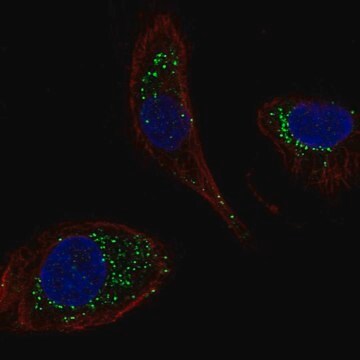ABN1657
Anti-RME-8
from rabbit, purified by affinity chromatography
Synonym(e):
DnaJ homolog subfamily C member 13, Required for receptor-mediated endocytosis 8, RME-8
About This Item
Empfohlene Produkte
Biologische Quelle
rabbit
Qualitätsniveau
Antikörperform
affinity isolated antibody
Antikörper-Produkttyp
primary antibodies
Klon
polyclonal
Aufgereinigt durch
affinity chromatography
Speziesreaktivität
human, monkey, rat, mouse
Methode(n)
immunocytochemistry: suitable
western blot: suitable
NCBI-Hinterlegungsnummer
UniProt-Hinterlegungsnummer
Versandbedingung
ambient
Posttranslationale Modifikation Target
unmodified
Angaben zum Gen
human ... DNAJC13(23317)
Allgemeine Beschreibung
Spezifität
Immunogen
Anwendung
Neurowissenschaft
Western Blotting Analysis: A representative lot detected RME-8 associated with the 20,000 xg pelleted insoluble fraction from the HEPES buffer homogenates of human skin fibroblast MCH46, breast epithelial MCF10A, and embryonic kidney HEK293T cells (BT-474, HeLa, SK-BR-3) cells (Ioannou, M.S., et al. (2016). J. Biol. Chem. In press).
Western Blotting Analysis: A 1:1,000 dilution from a representative lot detected shRNA-mediated RME-8 downregulation in HEK293T cells (Courtesy of Peter McPherson, Ph.D., FRSC, and Martine Girard, PhD, McGill University, Canada).
Immunocytochemistry Analysis: A representative deteced a reduced RME-8 immunoreactivity in HeLa cells transfected with shRNA targeting either RME-8 or Spastin (Freeman, C.L., et al. (2014). J. Cell Sci. 127(Pt 9):2053-2070).
Immunocytochemistry Analysis: A representative lot detected puntate endosomal RME-8 immunoreactivity by fluorescent immunocytochemistry staining of 2% paraformaldehyde-fixed, 0.2% Triton X-100-permeabilized COS-7 cells. LIttle RME-8 immunoreactivity was seen associated with TGN, lysosome, or plasma membrane, RME-8 shRNA transfection greately abolished cellular immunostaining (Girard, M., et al. (2005). J. Biol. Chem. 280(48):40135-40143).
Western Blotting Analysis: A representative lot detected the presence of RME-8 in WASH complex immunoprecipitated from HeLa cells (BT-474, HeLa, SK-BR-3) cells (Freeman, C.L., et al. (2014). J. Cell Sci. 127(Pt 9):2053-2070).
Western Blotting Analysis: Representative lots detected a greatly reduced ~200 kDa target band in lysates from RME-8 shRNA-transfected monkey (COS-7) and human (BT-474, HeLa, SK-BR-3) cells (Freeman, C.L., et al. (2014). J. Cell Sci. 127(Pt 9):2053-2070; Girard, M., and McPherson, P.S. (2008). FEBS Lett. 582(6):961-966; Girard, M., et al. (2005). J. Biol. Chem. 280(48):40135-40143).
Western Blotting Analysis: A representative lot detected the ~200 kDa RME-8 target band in postnuclear extracts from multiple rat tissues as well as from human, monkey, mouse, and rat cell lines. RME-8 was found enriched in rat kidney tissue-derived subcellular fractions representing microsomes and clathrin-coated vesicles (CCVs), but not cytosol or plasma membrane (Girard, M., et al. (2005). J. Biol. Chem. 280(48):40135-40143).
Qualität
Western Blotting Analysis: A 1:500 dilution of this antibody detected RME-8 in 10 µg of NIH/3T3 cell lysate.
Zielbeschreibung
Physikalische Form
Lagerung und Haltbarkeit
Note: Variability in freezer temperatures below -20°C may cause glycerol containing solutions to become frozen during storage.
Sonstige Hinweise
Haftungsausschluss
Sie haben nicht das passende Produkt gefunden?
Probieren Sie unser Produkt-Auswahlhilfe. aus.
Lagerklassenschlüssel
10 - Combustible liquids
WGK
WGK 2
Analysenzertifikate (COA)
Suchen Sie nach Analysenzertifikate (COA), indem Sie die Lot-/Chargennummer des Produkts eingeben. Lot- und Chargennummern sind auf dem Produktetikett hinter den Wörtern ‘Lot’ oder ‘Batch’ (Lot oder Charge) zu finden.
Besitzen Sie dieses Produkt bereits?
In der Dokumentenbibliothek finden Sie die Dokumentation zu den Produkten, die Sie kürzlich erworben haben.
Unser Team von Wissenschaftlern verfügt über Erfahrung in allen Forschungsbereichen einschließlich Life Science, Materialwissenschaften, chemischer Synthese, Chromatographie, Analytik und vielen mehr..
Setzen Sie sich mit dem technischen Dienst in Verbindung.